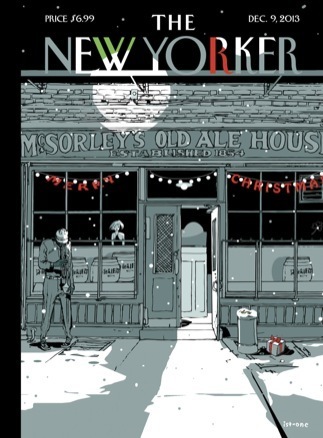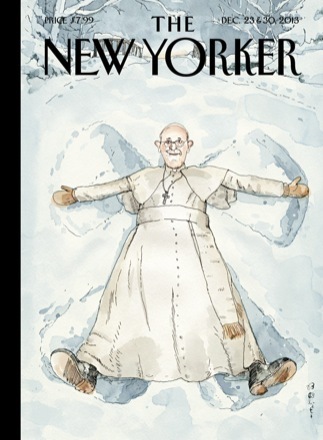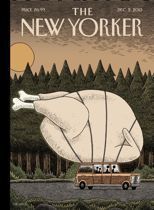Clifford Garstang's Blog, page 67
December 29, 2013
The New Yorker: “The Late Novels of Gene Hackman” by Rivka Galchen
 December 9, 2013: “The Late Novels of Gene Hackman” by Rivka Galchen
December 9, 2013: “The Late Novels of Gene Hackman” by Rivka Galchen
There isn’t too much to be learned from the Q&A with Rivka Galchen other than that her model for the story was one by Roberto Bolano.
A writer, J, takes her stepmother, Q, to a writers conference in Key West. J gets carried away with worry about Q, and is perhaps condescending toward her. At parties, she becomes very protective, but it is J who is making the missteps. In the end, J realizes that Q is rather competent. The end.
There’s not much meat there, I don’t think, but it’s terrifically engaging, and pretty funny. Plus it’s set against the backdrop of a writers’ conference, so there’s that. (Care to speculate about who the various writers are?)
December 23, 2013
The New Yorker: “The Christmas Miracle” by Rebecca Curtis
 December 23 & 30: “The Christmas Miracle” by Rebecca Curtis
December 23 & 30: “The Christmas Miracle” by Rebecca Curtis
Wow. This story did nothing for me at all. While I admire the stories three independent threads (as the author discusses in the Q&A with Rebecca Curtis), it left me cold. It also felt incomplete—with none of the threads resolved. Furthermore, the narrator’s very strange behavior isn’t explained. Nor is any exploration made of the dirty old Uncle’s probable abuse of the narrator and her siblings when they lived under his roof. (He’s a pedophile, apparently, and they moved in with him when all four were under the age of six.)
I suppose the New Yorker took this story to use in its Christmas issue. Many members of a family descend on one house—a very strange house it is, too—in which cats are dying. They’re being attacked by coyotes in the backyard. The uncle is a pedophile. The narrator (who is telling the story to a friend in a letter after the event) is on various medicines and is confused by treatments relating to her Lyme disease, which has also affected several members of her family.
Although I didn’t like the story, I did like the scene in which the narrator is hallucinating all her family members as various animals. That was brilliant.
December 5, 2013
Interview up at Street Talk
 The kind folks at Braddock Avenue Books have posted an interview with me in their Street Talk Series. Please take a moment to look it over: Bearing Witness, an Interview with Clifford Garstang
The kind folks at Braddock Avenue Books have posted an interview with me in their Street Talk Series. Please take a moment to look it over: Bearing Witness, an Interview with Clifford Garstang
And while you’re there, check out the press’s offerings.
December 3, 2013
The New Yorker: “Roadkill” by Romesh Gunesekera
 December 2, 2013: “Roadkill” by Romesh Gunesekera
December 2, 2013: “Roadkill” by Romesh Gunesekera
This story reminds me of my one and only visit to Sri Lanka. At the time, there were still troubles in parts of the country, so my visit was limited. I flew into Colombo, hired a driver, and visit a few hill stations and safe tourist spots. It was fantastic, but it was kind of weird to be with this guide/driver who stayed in a different part of the hotels, ate elsewhere, and was generally invisible.
In this story, it is the tourists who are invisible. The guide has driven them to a stop along the way of their journey and, as a mere driver, is given a paltry dinner. He is visited by the Guest Relations officer who wants to make sure he brings other visitors to the hotel. While they are sitting at the dining table, they spot a rat and the woman throws a bottle at it, killing it. While making small talk, the driver asks about her family, which he is told he should not ask about—clearly, she can’t or doesn’t want to talk about whatever happened to her family during the war. Similarly, she says she is trained in hotel management, but it appears that she’s more likely trained in guerilla warfare.
The story is deliciously vague in some details about the war. As the narrator says at the end, “There comes a point when you don’t want to know.”
Interesting story about different view points on a national tragedy—whether it’s better to forget and move on or to delve in and try to understand. The author doesn’t seem to be taking a position, only suggesting that there are both these points of view and we have to accept that.
December 1, 2013
Philosophy Project
 College was a long time ago, but I was a philosophy major. I chose philosophy because I was intrigued, nothing else particular grabbed me, and I thought it was a good foundation for both literature and law, which I thought I might want to make my career.
College was a long time ago, but I was a philosophy major. I chose philosophy because I was intrigued, nothing else particular grabbed me, and I thought it was a good foundation for both literature and law, which I thought I might want to make my career.
It turns out I was right about my career, and I think the study of philosophy WAS good preparation for both these fields. The problem is, I don’t really remember anything I studied. And I don’t think I’ve EVER remembered what I learned in those courses, most of which were in the nature of the history of philosophy. I suppose I learned enough to pass the exams and write the papers, but, please don’t ask me any questions.
I’m not proud of this, and so I’d like to start over again and RE-learn it all. As a lifelong bibliophile, I still have most of my college philosophy texts, plus several more that I’ve picked up along the way. I’m not saying that I’m going to read them all again, but I am going to try to make some sense of it. No time like the present.
Starting with the Ancients . . .
November 29, 2013
On the Air
 I just did my first radio interview. I’ve done podcasts and blog-talk internet “radio” before, but this was the first time in a radio station, sound-proof booth, the works. It was fun!
I just did my first radio interview. I’ve done podcasts and blog-talk internet “radio” before, but this was the first time in a radio station, sound-proof booth, the works. It was fun!
As with so much of my current exposure, the impetus for this interview was my Library of Virginia Award, which was announced a month ago. It helped, I have to say, that I know the interviewer–Martha Woodroof, of WMRA (the local NPR affiliate)–and so I was perfectly comfortable sitting down with her to have a conversation about writing. (Martha is a novelist herself–her debut novel comes out next year–and we’ve met a few times to do just that.)
We chatted about my legal career, how I got started writing, the process of publishing, finding out about the Award, etc. The time went by fast. The only time it felt at all odd was when I paid attention to the microphones between us. I was looking at Martha as we spoke, but that meant that I was looking through a tangle of microphone infrastructure. A little strange.
I don’t know when the interview will air, but I’ll be sure to spread the word.
November 25, 2013
The New Yorker: “Kilfi Creek” by Lionel Shriver
 November 25, 2013: “Kilfi Creek” by Lionel Shriver
November 25, 2013: “Kilfi Creek” by Lionel Shriver
This is a readable story, if only because one wants to know if the protagonist, Liana, finally grows up. She seems to, and by then it’s too late.
The bulk of the story is centered around an incident that takes place on her youthful first trip to Africa. She imposes on some friends of friends and stays at their home. While swimming in Kilfi Creek, she cuts her foot and nearly drowns (the result not of the cut but of underestimating the current in the creek). While we’re waiting to learn if she survives, the POV shifts to her unwilling hosts. That’s a nifty trick to maintain the suspense, although it does break some story-writing rules. (Tough. As I tell my students, there are no rules.)
Flash forward. Liana has survived many more near misses, including a bad marriage. And now, having been promoted, having found a nice apartment in Manhattan, having met a man she likes . . .
But I don’t want to spoil the ending for you!
I seem to be seeing a lot of main characters I don’t like lately. The problem with Liana is that she’s an “ugly American” and seems ill-bred. There’s an odd discussion in the Q&A with Lionel Shriver where Shriver is asked if Liana’s gender matters, as if a man wouldn’t behave the way she does. Shriver’s answer is right on: of course it doesn’t matter.
November 24, 2013
The New Yorker: “Find the Bad Guy” by Jeffrey Eugenides
 November 18, 2013: “Find the Bad Guy” by Jeffrey Eugenides
November 18, 2013: “Find the Bad Guy” by Jeffrey Eugenides
There’s not a lot to learn from the Q&A with Jeffrey Eugenides, but there it is anyway.
Charlie D. is a fake. He’s from Michigan, but he’s put on a Texas drawl to fit in, complete with down-home expressions. He’s married to a tall German woman, and they’re in counseling, after he confessed to sleeping with the babysitter. In terms of plot, that’s about it. Charlie’s voice is fun, and some of the details are great: he is interested in the smell of houses; he plays Words with Friends with his daughter; his marriage to his wife was, initially, a sham to get her a green card, but they fell in love; she’s very tall and successful at work (she works at Hyundai, although they drive a Nissan); and so on.
But the bulk of the story is the two of them playing “Find the Bad Guy” in counseling and Charlie moping outside the house.
It’s pleasant enough.
November 6, 2013
Visiting Writer at Randolph College
 I am in the middle of a four-week stay as the Visiting Writer at Randolph College in Lynchburg, Virginia. It’s been a blast so far!
I am in the middle of a four-week stay as the Visiting Writer at Randolph College in Lynchburg, Virginia. It’s been a blast so far!
I arrived on a Sunday and we taken to the apartment used for this purpose. It’s a nice little one bedroom space very close to campus. The next morning, I got my campus tour, my introduction to the dining hall (where I can take all my meals if I want), the English Department office (importantly mostly for printing and photocopying), and my office. (Because the apartment doesn’t have Internet, I am spending a LOT of time in the office.)
My duties are not onerous. I am teaching one seminar for Seniors and a few Juniors that meets once a week for three hours. We’re talking about short story writing and their work product at the end will be a complete story. An installment of the story is due each week and we will workshop them all in the last class. In addition to that, I’ll give a reading one night when I’m here (Nov. 13, 8:15 pm) and will visit two other classes. The rest of the time I’m writing (and taking care of other matters–editing the magazine and the anthology, wrapping up the two online classes I’m teaching, etc.)
It’s been fun. The school is beautiful and the people are extremely friendly and polite. I haven’t explored Lynchburg much, but it also seems like a pretty cool town.
The New Yorker: “Benji” by Chinelo Okparanta
 November 11, 2013: “Benji” by Chinelo Okparanta
November 11, 2013: “Benji” by Chinelo Okparanta
I guess unlikable characters are a thing now, because it’s hard to like any of these people. It’s also somewhat difficult to figure out whose story this is supposed to be. The title suggests that it’s Benji’s story, and maybe it is—in the middle of the story we switch to his point of view—but at the beginning the story is in the point of view of Alare, an older woman with whom Benji is having an affair, and the story feels very much like her story. The switch seems to suggest a change in sympathy for the characters, although in the end I have little sympathy for either.
The setting is Nigeria. Alare visits Benji’s mother in her home and eventually begins an affair with Benji, even though she is older and Benji is nearly a dwarf. She gets money from the wealthy Benji by claiming that her husband is ill even after Benji’s mother dies. This goes on for some time and eventually we switch to Benji’s point of view. He becomes suspicious of Alare and goes to her home, where he discovers the truth.
The Q&A with Chinelo Okparanta isn’t all that helpful, but it does shed a little like on Okparanta’s thinking.
In the end, although I don’t like the characters, I do like the story. The POV switch is unusual and so is the situation, as is the twist at the end.



